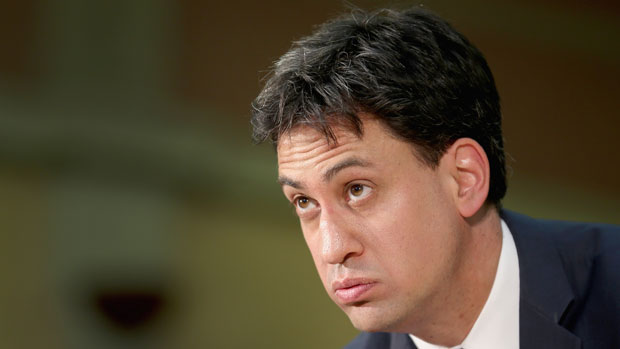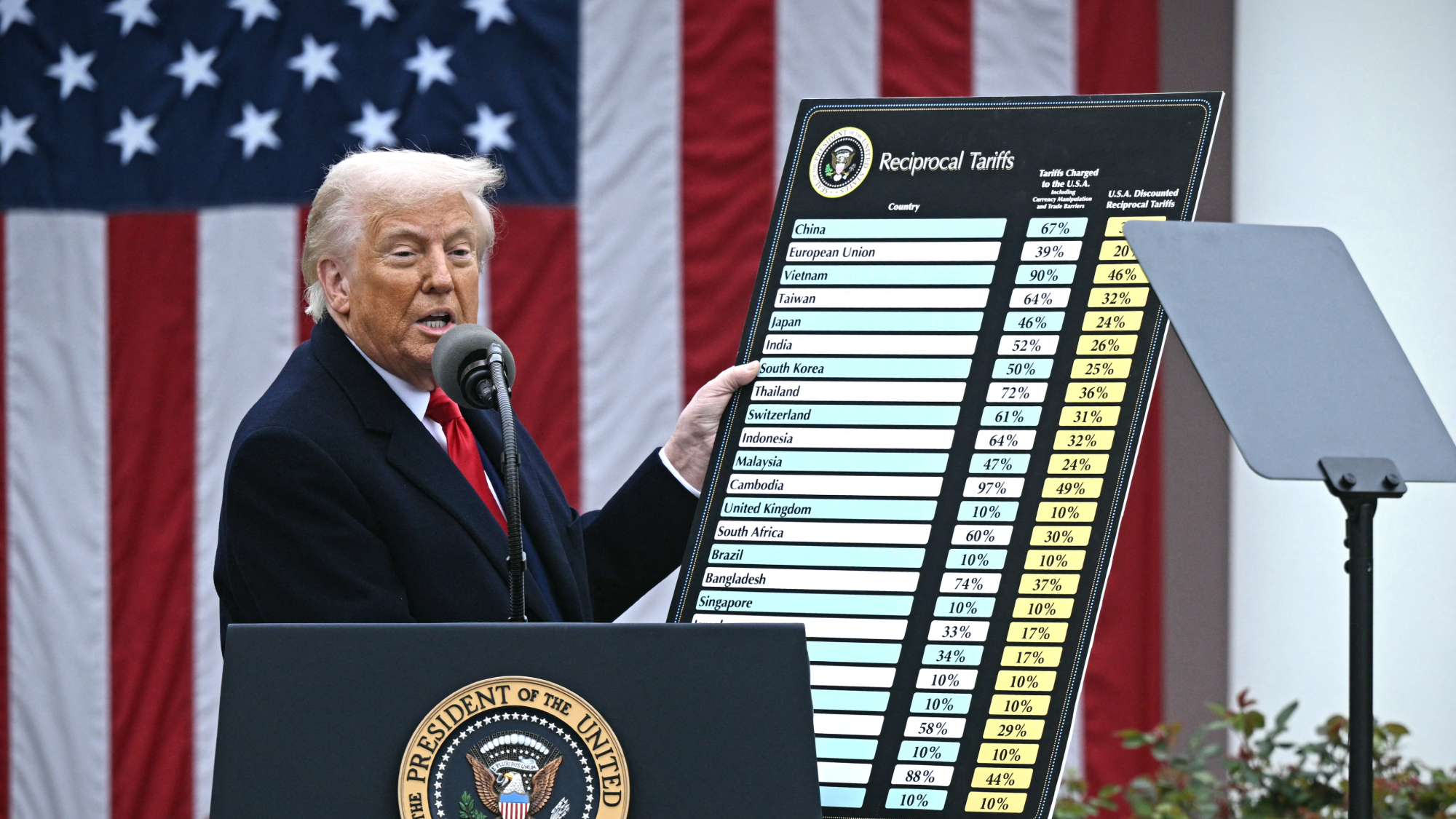Inflation rises again: hiccup on the road to economic stability
Latest figures play into Ed Miliband's hands – though he appears out-of-touch with his own family finances

A free daily email with the biggest news stories of the day – and the best features from TheWeek.com
You are now subscribed
Your newsletter sign-up was successful
The latest inflation figures, released this morning, show the year-on-year rate rose from 1.6 per cent in March to 1.8 per cent for April. It's a hiccup David Cameron could have done without two days ahead of the local and European elections.
Wage figures for April, due out tomorrow, are expected to show slower growth – 1.7 per cent or less – which would add strength to Labour leader Ed Miliband’s claim that Cameron and George Osborne, the Chancellor, are out of touch with ordinary people and the cost-of-living crisis affecting them.
Earlier this week, Mark Carney, the Governor of the Bank of England, suggested Britain was about to experience “sustained real wage growth”.
The Week
Escape your echo chamber. Get the facts behind the news, plus analysis from multiple perspectives.

Sign up for The Week's Free Newsletters
From our morning news briefing to a weekly Good News Newsletter, get the best of The Week delivered directly to your inbox.
From our morning news briefing to a weekly Good News Newsletter, get the best of The Week delivered directly to your inbox.
But if prices are rising faster than wages again, that will put a big question-mark over Carney's assumption. As the BBC's Economics Editor, Robert Peston, tweeted: '"Looks like [a] squeeze in real earnings again... no great surge in living standards."
However, today's inflation figures from the Office of National Statistics do raise a glimmer of hope that the super-inflationary rise in house prices could be tailing off. Average house prices across the UK rose year-on-year by eight per cent in April, compared with 9.2 per cent in March.
However, there are wide disparities across the regions: in London, the year-on-year increase has fallen from 17.8 per cent to a still staggering 17 per cent, while in the Northwest the rate has fallen from 5.9 per cent to 3.1 per cent.
Carney, who is conducting a review of the government's controversial help-to-buy scheme to see if it is contributing to the over-heating of the housing market, may still need to intervene.
A free daily email with the biggest news stories of the day – and the best features from TheWeek.com
The Prime Minister told Radio 4's Today programme - before the new inflation figures came out - that he would consider reducing the current upper limit of £600,000 on the help-to-buy scheme in order to reduce the subsidised mortgages for those seeking to buy the most expensive houses.
Commenting on the new inflation figures, TUC general secretary Frances O’Grady said: "Last month we were told the living standards crisis was over, yet one month later… even on a measure that excludes the cost of housing, prices are rising faster than wage packets.
"It will be years before workers even recover the earnings they have lost since 2008, let alone start to feel any better off."
A general election voting intention poll for Tory peer Lord Ashcroft published yesterday showed Labour have, in just a week, climbed from two points behind the Tories to six points ahead (35 per cent to 29 per cent). This huge disparity suggests the Tory peer's new polling needs to settle in.
But it should be of concern to Cameron and Osborne that Ashcroft's polling shows Labour currently enjoying a 13-point lead over the Tories on “tackling the cost of living”.
On the other hand, Ed Miliband did not cover himself with glory this morning when he was asked on ITV's Good Morning to say how much his family spent on the weekly shopping bill.
Miliband, clearly unsure, took a stab at £70 - until it was pointed out that even the average British family food bill is over £100.
On the campaign trail, the Labour leader hurriedly adjusted his sums after talks with his spin-doctors. He told BBC Radio Oxford: "Well, I said this morning it was on the basic groceries, the basic fruit and vegetables, about £70 or £80 - the total shopping bill was slightly higher than that, obviously."
Er, yes, obviously.
-
 Magazine solutions - February 27, 2026
Magazine solutions - February 27, 2026Puzzle and Quizzes Magazine solutions - February 27, 2026
-
 Magazine printables - February 27, 2026
Magazine printables - February 27, 2026Puzzle and Quizzes Magazine printables - February 27, 2026
-
 ‘The forces he united still shape the Democratic Party’
‘The forces he united still shape the Democratic Party’Instant Opinion Opinion, comment and editorials of the day
-
 How corrupt is the UK?
How corrupt is the UK?The Explainer Decline in standards ‘risks becoming a defining feature of our political culture’ as Britain falls to lowest ever score on global index
-
 Does standing up to Trump help world leaders at home?
Does standing up to Trump help world leaders at home?Today’s Big Question Mark Carney’s approval ratings have ‘soared to new highs’ following his Davos speech but other world leaders may not benefit in the same way
-
 How long can Keir Starmer last as Labour leader?
How long can Keir Starmer last as Labour leader?Today's Big Question Pathway to a coup ‘still unclear’ even as potential challengers begin manoeuvring into position
-
 The high street: Britain’s next political battleground?
The high street: Britain’s next political battleground?In the Spotlight Mass closure of shops and influx of organised crime are fuelling voter anger, and offer an opening for Reform UK
-
 ‘They’re nervous about playing the game’
‘They’re nervous about playing the game’Instant Opinion Opinion, comment and editorials of the day
-
 Is a Reform-Tory pact becoming more likely?
Is a Reform-Tory pact becoming more likely?Today’s Big Question Nigel Farage’s party is ahead in the polls but still falls well short of a Commons majority, while Conservatives are still losing MPs to Reform
-
 Tariffs: Will Trump’s reversal lower prices?
Tariffs: Will Trump’s reversal lower prices?Feature Retailers may not pass on the savings from tariff reductions to consumers
-
 Taking the low road: why the SNP is still standing strong
Taking the low road: why the SNP is still standing strongTalking Point Party is on track for a fifth consecutive victory in May’s Holyrood election, despite controversies and plummeting support